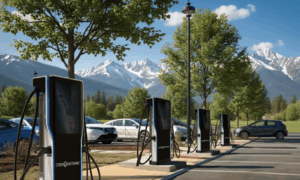
Home / EV Charging News / Urban planning: Electric cars and charging infrastructure implications
As the world transitions towards a cleaner and greener future, the shift towards electric cars is gaining momentum. The rise of electric cars has significant implications for urban planning, including the need for new zoning regulations and the development of charging infrastructure in residential areas. In this article, we will explore the implications of electric cars and charging infrastructure on urban planning.
While the benefits of electric cars and charging infrastructure are clear, there are also challenges that cities will need to address. Here are some of the challenges:
The shift towards electric cars is a significant opportunity for cities to create a more sustainable future. However, this shift requires significant investment in charging infrastructure, new zoning regulations, and consumer education. By embracing electric cars and investing in sustainable urban planning, cities can reduce their carbon footprint and create a cleaner and greener future for everyone.



